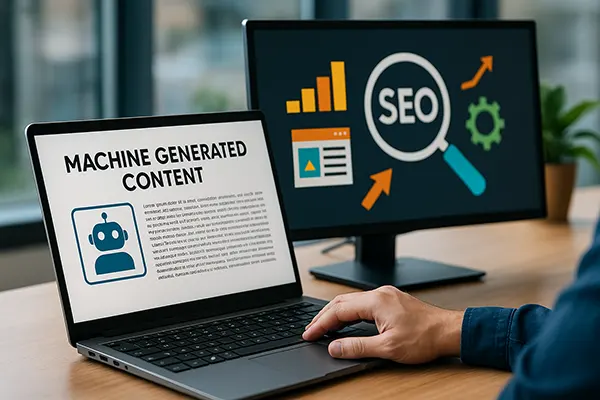
How AI-Generated Content Affects SEO: Risks and Opportunities
Artificial intelligence has become an inseparable part of digital marketing. In 2025, over 70% of companies use AI-driven tools for creating or optimising content, according to data from Statista. Yet, its growing presence raises a critical question: how does AI-generated content influence search rankings and the broader SEO landscape? Understanding both its benefits and risks is essential for anyone working with search optimisation today.
The Role of AI in Modern SEO Strategies
AI technology significantly accelerates content creation. It enables marketers to produce articles, metadata, and even keyword structures at unprecedented speed. Platforms such as ChatGPT, Jasper, and Writesonic now integrate directly into CMS systems, helping teams publish optimised content in seconds. However, Google’s guidelines clearly state that automation must serve users, not manipulate rankings.
Search algorithms in 2025 are more advanced than ever. Google’s latest Helpful Content Update evaluates expertise, accuracy, and user satisfaction metrics. It distinguishes between automatically produced material and content refined by human editors. The winning strategy combines AI efficiency with human experience — a balance between automation and authenticity.
Moreover, AI helps identify search intent patterns. SEO specialists can use machine learning to analyse voice searches, featured snippets, and user behaviour. These insights improve content relevance and make it easier to match users’ informational needs. AI becomes a tool of precision, not replacement.
Balancing Automation and Human Expertise
One of the biggest challenges for SEO professionals is maintaining authenticity. While AI can generate thousands of words, it lacks lived experience — the “Experience” in Google’s E-E-A-T framework. Search engines now prioritise content that demonstrates personal expertise and verifiable knowledge. Articles created solely by algorithms risk being classified as low-value.
Human input ensures factual accuracy, emotional connection, and ethical consistency. Editors verify data, provide context, and adjust tone for specific audiences. This process transforms machine-generated drafts into reliable resources that users trust. The integration of both human and AI input is no longer optional but fundamental.
Brands investing in editorial oversight gain long-term benefits. They build authority, maintain ranking stability during algorithm shifts, and foster audience trust. In 2025, successful SEO depends less on quantity and more on quality — measured through user engagement and content depth.
Risks of Using AI-Generated Content
Automated content carries significant risks. When poorly monitored, it can lead to factual inaccuracies, plagiarism, or repetitive phrasing. Search engines like Google and Bing are developing advanced AI-detection algorithms that penalise low-quality or deceptive material. Websites relying exclusively on automation have already seen traffic declines after recent updates.
Another danger lies in over-optimisation. Some marketers still use AI to stuff keywords or imitate competitor structures. This approach violates Google’s spam policies and damages long-term visibility. Algorithms in 2025 measure user satisfaction signals — such as dwell time and bounce rates — making manipulative SEO tactics obsolete.
Additionally, ethical concerns are rising. Using AI without disclosure may reduce transparency and damage brand credibility. Readers expect to know how information is produced and by whom. According to a 2025 Deloitte survey, 64% of users are more likely to trust content openly stating its use of AI assistance.
Maintaining Transparency and Compliance
To mitigate these risks, transparency must be integrated into every SEO process. Authors should disclose when AI tools have contributed to drafting or data analysis. This builds credibility and aligns with Google’s guidance on AI usage published in 2024. Honest disclosure does not harm rankings — on the contrary, it enhances trust signals.
Legal frameworks also play a role. The European Union’s AI Act, fully implemented in 2025, requires clear labelling of AI-generated content in certain industries, especially finance, health, and media. Non-compliance may result in reputational and financial penalties. Therefore, companies must treat AI content governance as seriously as data protection.
Internal quality control remains vital. Every AI-assisted article should undergo manual review to verify statistics, language, and factual integrity. Using structured editorial workflows ensures compliance with both ethical standards and search engine expectations.

Opportunities Brought by AI in SEO
Despite its risks, AI introduces powerful opportunities for growth. Automated analytics identify trending topics, analyse competitors, and recommend keyword clusters with unprecedented accuracy. Natural language models now predict semantic relationships, enabling deeper optimisation beyond simple keyword matching.
AI also improves accessibility. It can translate articles into multiple languages, generate meta tags automatically, and personalise search snippets for user segments. For global brands, this means broader visibility and more inclusive communication without losing accuracy or context.
Finally, AI contributes to sustainability in digital marketing. By reducing redundant manual work and improving targeting, it helps businesses allocate resources efficiently. Combined with human oversight, AI becomes a strategic partner in building reliable, knowledge-driven SEO ecosystems for the next decade.
The Future of Human-AI Collaboration in SEO
The next evolution of SEO lies in intelligent collaboration. AI handles repetitive analysis, while human experts focus on strategy, creativity, and relationship building. This synergy leads to higher-quality publications that meet both technical and human standards. In 2025, search success depends on this cooperation.
Brands adopting hybrid workflows are already outperforming competitors. According to SEMrush’s 2025 digital performance report, mixed human-AI teams deliver 40% more organic traffic than purely manual ones. The combination of insight, empathy, and automation defines the new benchmark for excellence.
Ultimately, the ethical use of AI in SEO is about responsibility. When managed wisely, it strengthens credibility, enhances efficiency, and ensures that digital content remains genuinely helpful. The future belongs to those who understand how to guide machines — not those who let machines write for them.
